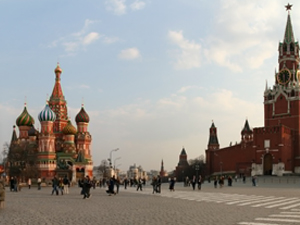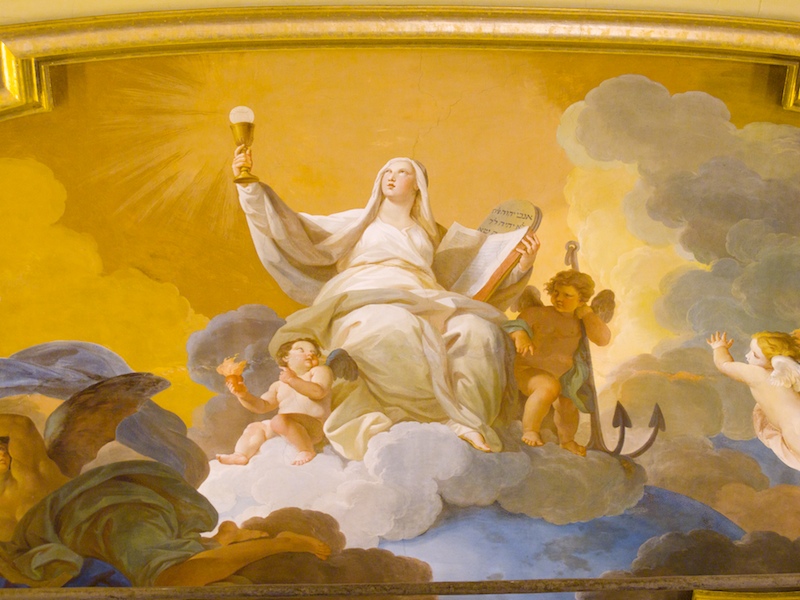 Pope Benedict XVI and Russian President Dmitry Medvedev met for 35 minutes on Thursday, February 17, in the Apostolic Palace at the Vatican.
Pope Benedict XVI and Russian President Dmitry Medvedev met for 35 minutes on Thursday, February 17, in the Apostolic Palace at the Vatican.
This meeting was rather long — sometimes such meetings with national leaders only last 20 or 25 minutes.
You can watch the public parts of the visit on YouTube: http://www.youtube.com/watch?v=b7z6kK3XfdU
The two men discussed a broad range of issues including the international situation and particularly the Middle East, the Vatican said after the meeting.
It was their second meeting — President Medvedev and Pope Benedict established full diplomatic relations between their respective states following a meeting in 2009.
An official communiqué from the Press Office of the Holy See said the Pope and the President held “cordial” discussions.
The statement went on to say the Pope and President recognized the broad-ranging cooperation between the Holy See and the Russian Federation in the promotion of specifically human and Christian values, and in the cultural and social field.
The statement also noted that the Pope and the President stressed the positive contribution inter-religious dialogue can make to society.
The Russian president brought Pope Benedict a painting of the Moscow cityscape, as well as a pair of volumes containing the correspondence of former Russian president Boris Yeltsin with other heads of state, including the venerable John Paul II, and an Orthodox encyclopedia.
The Pope gave President Medvedev a Mosaic portrayal of the Vatican.
Following his meeting with Pope Benedict, Medvedev and his foreign minister, Sergey Lavrov, met with the Cardinal Secretary of State, Tarcisio Bertone, who was himself accompanied by the secretary for Relations with States, Archbishop Dominique Mamberti.
Now what everyone is wondering is whether this state visit could have implications for the relationship between the two Churches, and could presage a meeting between the leaders of the two Churches, Pope Benedict and Patriarch Kirill of Moscow.
Because of the close ties between the Russian government and the Russian Orthodox Church, observers had anticipated that Medvedev might act as an intermediary, broaching the subject of a “summit meeting” between the pontiff and Patriarch Kirill.
In Moscow, Interfax, the news agency of the Moscow Patriarchate, reported that a meeting between the Patriarch of Moscow and All Russia and the Pope “will happen when there are appropriate conditions for that.”
Then an official downplayed the need for Medvedev to act as an intermediary, saying the Church itself would issue the invitation when the time was ripe.
“The Russian Orthodox Church and the Roman Catholic Church maintain a regime of constant communication and consultations at various levels,” the deputy head of the Department for External Church Relations, Archpriest Nikolay Balashov, told Interfax-Religion. “And when, in the view of both parties, the time comes for the meeting between the leaders of two Churches, we will notify the international community.”
The context of the relationship between the two Churches should not be linked to the meeting between Russian President Dmitry Medvedev and Pope Benedict XVI in Vatican city on Thursday, he stressed.
Still, an unnamed source from the Russian presidential delegation said ahead of Medvedev’s formal visit to the Vatican: “Currently, the meeting between the leaders of the two Christian Churches is feasible more than ever. The Russian president could discuss this subject during a conversation with the Pope,” the Russian newspaper Kommersant wrote on Thursday.
But there is no question yet of delivering a formal invitation to the Pope to visit Russia, he added.
The Associated Press in its account of the meeting noted that “Pope Benedict XVI and visiting Russian President Dmitry Medvedev are expressing the desire to further strengthen ties and stressing the promotion of shared values.”
The AP report added this amusing note: “The Pope remarked that he ought to learn Russian in brief comments in front of reporters following the half-hour private meeting Thursday at the Vatican, although there was no indication Benedict would go to Russia.”
This little remark of the Pope suggests that perhaps there was some discussion of a papal trip to Russia in coming years — time enough for the Pope to learn a few phrases of Russian before he makes the trip.
Of course, Benedict’s predecessor, Pope John Paul II, wished to visit Russia, but never could do so as the Russian Orthodox Church was opposed to such a visit.
The Official Vatican Communique
Today, 17 February 2011, the Holy Father Benedict XVI received in audience Dmitry Medvedev, president of the Russian Federation. Subsequently the president, accompanied by Sergey Lavrov, minister for foreign affairs, went on to meet with Cardinal Secretary of State Tarcisio Bertone S.D.B. who was accompanied by Archbishop Dominique Mamberti, secretary for Relations with States.
In the course of the cordial discussions, the parties expressed their pleasure at the good state of bilateral relations and highlighted their desire to strengthen them, also in the wake of the establishment of full diplomatic relations. The broad-ranging collaboration between the Holy See and the Russian Federation was recognised, both in the promotion of specifically human and Christian values, and in the cultural and social field. Subsequently, emphasis was given to the positive contribution inter-religious dialogue can make to society. Finally, attention turned to the international situation, with particular reference to the Middle East.
General Observations on Holy See-Moscow Patriarchate Relations
My friend Peter Anderson, a Catholic from Seattle, Washington, who follows Catholic-Orthodox affairs very closely, has sent me a number of “signs of the times” which are of some interest. Here they are:
Relations between the Vatican and the Moscow Patriarchate have warmed considerably in recent years. Russian Orthodox leaders have indicated that they are more comfortable with Pope Benedict XVI than with Pope John Paul II, whose Polish background roused old ethnic animosities. The death of Patriarch Alexei II in 2008, and the election of Patriarch Kirill — who had been the top ecumenical-affairs officer for the Russian Orthodox Church — brought still more hope for ecumenical prospects.
As the Pope and Medvedev were meeting in Rome, Father Milan Zust, SJ, of the Pontifical Council for Promoting Christian Unity (the Pope’s office for carrying on ecumenical dialogue) was in Moscow to give a lecture to the students of the St. Cyril and Methodius Post-Graduate School of the Moscow Patriarchate.
Sharing his personal experiences, Father Milan stressed the importance of contacts and meetings between Catholics and Orthodox to overcome past estrangement. The lecture included a lively discussion with students.
(Here is a report on this lecture: http://www.mospat.ru/ru/2011/02/17/news36461)
And this week, the Inter-Orthodox Preparatory Commission is meeting in Chambesy, Switzerland (21-27 February 2011). The Moscow Patriarchate’s delegation will consist of Metropolitan Hilarion of Volokolamsk, chairman of the Moscow Patriarchate’s Department for External Church Relations (DECR) – head of the delegation; Archbishop Mark of Berlin-Germany and Great Britain – member of the delegation; and archpriest Nikolai Balashov, DECR deputy chairman – consultant of the delegation.
Next month, the German Catholic charity Aid to the Church in Need (Kirche in Not) will hold its Fourth International Congress in Wurzburg, Germany. On March 19, as part of the Congress, a round-table discussion will be held on the relations between the Catholic and Orthodox Churches since the end of the Soviet Union. Both Cardinal Kurt Koch of the Pontifical Council for Promoting Christian Unity and Metropolitan Hilarion will take part in a roundtable discussion on this topic. (http://www.treffpunkt-weltkirche.de/aktuelle-meldungen/2010/01-24-test)
Kirche in Not, an international Catholic charitable organization headquartered in Koenigstein, Germany, near Frankfurt, provides financial aid to the Moscow Patriarchate as well as to the Catholic Church in Russia. Perhaps its most well-known work in Russia has been to finance for the Moscow Patriarchate chapel boats that provide Orthodox church services to small communities along the Volga River. The head of the Russia section of Kirche in Not is a Russian Orthodox, Peter Humeniuk, who will also participate in the panel discussion. (Humeniuk deserves a great deal of credit for his outstanding work in improving Catholic-Orthodox relations.)
Also, Prof. Doctor Barbara Hallensleben advises that Cardinal Koch will also attend the March 25 events relating to the conferral of an honorary professorship on Metropolitan Hilarion by the University of Fribourg, Switzerland.
Also, three days ago [from Tuesday 2/22], it was announced that the University of Fribourg was establishing a Center for Russian Studies (the first of its kind in Switzerland; http://www.mospat.ru/ru/2011/02/16/news36407)
Lastly, and perhaps most surprisingly, Metropolitan Hilarion was in Dallas, Texas, last weekend. While there, he met with the president, faculty, and students of the Dallas Theological Seminary.
(See: http://www.mospat.ru/en/2011/02/13/news36217)
This is evidently one of the first efforts by the Moscow Patriarchate to reach out to the Evangelical churches, perhaps the fastest growing Christian group.
Metropolitan Hilarion stressed the need for various Christian denominations to defend traditional moral values. It raises the question of whether the “alliance” of Orthodox, Catholic, and Eastern Churches to defend traditional Christian values, frequently mentioned by Metropolitan Hilarion, should also the enlist the support of conservative Evangelical groups. [More on this visit in part three.]
Vatican Names New Ambassodor to Russia
Just two days after his meeting with Medvedev, Pope Benedict XVI on Saturday, February 19, appointed Archbishop Ivan Jurkovic (photo) as Vatican ambassador to Russia.
Jurkovic was born in Kocebje, Ljubljana, on June 10, 1952. He was ordained a priest in 1977 and served in the Ljubljana archdiocese. In 1984 he entered the Vatican diplomatic service.
Jurkovic served at the apostolic nunciatures in South Korea and Colombia before a stint as an advisor at the Vatican embassy in Russia from 1992 to 1995. He was an adviser at the Vatican Secretariat of State from 1996 to 2001.
Ordained bishop in 2001, Jurkovic was apostolic nuncio to Byelorussia in 2001-2004 and to Ukraine in 2004-2011.
Jurkovic, who holds the degree of doctor of canon law, knows Italian, Russian, Spanish, English, German, French and Ukrainian in addition to his native Slovenian.
In his new appointment he replaces Archbishop Antonio Mennini, who was named as ambassador to Britain two months ago.
During his eight-year tenure in Moscow, Archbishop Mennini played a decisive role in improving relations between Orthodox and Catholics. In fact, the day after the papal audience, President Medvedev signed an order conferring on him the honor of the “Order of Friendship,” in recognition of his work to improve relations between the Holy See and Russia.
Dr. Robert Moynihan
Note to readers: Consider joining Dr Robert Moynihan, editor and founder of Inside the Vatican magazine, in Italy for Easter on our annual Holy Week pilgrimage (only a few seats left). We also will have a small pilgrimage for those wishing to attend the beatification of Pope John Paul II on May 1. We are also planning a small pilgrimage to Russia in July. For more information please call 904.699.0960 or email pilgrimage@insidethevatican.com or visit: http://insidethevatican.com/pilgrimage.htm#easter2011



